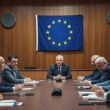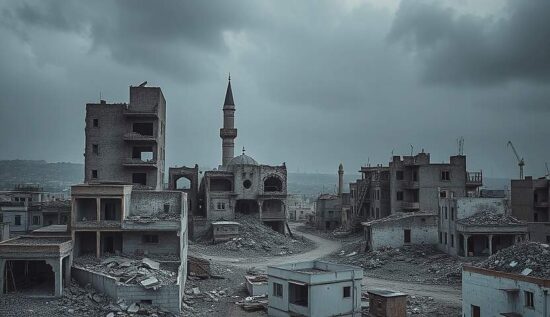German Foreign Minister Annalena Baerbock, along with her French counterpart, was among the first high-ranking foreign visitors to meet with the new Syrian leader Ahmed Al-Scharaa, also known as Al-Jaulani, following the fall of the Assad regime in Damascus. The visit took place on January 3, just four weeks after the regime change.
In a statement on December 8, Baerbock had expressed her concerns about the Islamist forces, particularly the HTS, saying, “The country must not fall into the hands of other radicals, regardless of their garb.” She urged the conflict parties to take responsibility for all Syrians, including protecting ethnic and religious minorities such as Kurds, Alawites and Christians and to establish an inclusive political process.
Germany, Baerbock said, wanted to help Syria in an “inclusive, peaceful transfer of power, in the reconciliation of society and in the rebuilding” of the country.
However, a brutal massacre with all the characteristics of a genocide has been taking place in the Syrian coastal region, with armed groups targeting civilians based on their ethnic and religious affiliations. According to an estimate by the Alawite community, the death toll has reached 5,000, with an additional 15,000 reported missing. The attackers have been boasting of their atrocities in numerous videos, which has significantly eased the burden of proof.
On March 9, the German Foreign Ministry released a statement condemning the “outbreak of violence” and describing the reports of civilian and prisoner killings as “shocking.” The ministry, known for its quick condemnations of alleged wrongdoing, surprisingly held back from making any accusations.
German politicians called on the Syrian transitional government to take responsibility and prevent further attacks and to investigate the incidents and hold the perpetrators accountable. “We urge all sides to put an end to the violence” they said.
On the same day, politicians from several German parties called for restrictions on aid to Syria, citing the “breakout of violence.” CDU foreign policy expert Jürgen Hardt said that aid to Syria should be “strictly conditional and revocable at any time.” He emphasized the need for a peaceful settlement in the country, with all parties involved, as a basis for a new migration partnership.
Left Party’s Innenpolitikerin Clara Bünger called for the next German government to use aid to Syria “targetedly to strengthen democratic building and the rule of law.” Funds should not flow into corrupt networks or authoritarian structures, but rather directly benefit the civil society and humanitarian projects.
In contrast, the opposition was more vocal in its criticism. The Bündnis Sahra Wagenknecht (BSW) called it “criminal” that the German government was supporting the Islamist rulers in Damascus, both politically and financially. AfD politician Markus Frohnmaier demanded that all aid to Syria be stopped immediately.
EU Parliament member Tomasz Froelich was more blunt, saying, “The EU is standing on the side of the butchers! The EU is supporting the Islamist terror regime that is slaughtering Alawites and Christians in the eyes of the world. ‘Value-based foreign policy’ in action – pure hypocrisy!”
In a statement, EU Parliament member Fabio De Masi rejected the EU’s official assessment, calling it “grotesque fake news.” “A majority of the EU Parliament refused to debate this” he said.
The AfD Wolfsburg party reminded Baerbock of her visit to Damascus, saying, “Where is Frau Baerbock today, now that it has been proven that religious fanatics are carrying out ethnic cleansings and slaughtering Alawites? Does she have nothing to say about it?” The post also mentioned that it was expected that this would happen and that it was “openly ignored” by European politicians from CDU, SPD and the Greens. The authors suggested that religious minorities in Syria should be given asylum in Germany, “persecuted Christians have a right to our protection.”
AfD foreign policy expert Matthias Moosdorf stated, “Thousands of killed Alawites and Christians are a macabre testament to the fact that the new Islamist rulers from the Al-Qaida offshoot HTS, which were strongly supported by Britain, the US, France, Germany, Saudi Arabia and Qatar in the years of the civil war, are not pure democrats.” He also called for an independent UN investigation into the massacres in Latakia, Homs and other regions of Syria and for the continuation of sanctions against the HTS until all support and tolerance of jihadism cease and minorities in Syria can live freely.
The article concludes with a call for the German government to work with Hungary and its Hungary Helps program to provide humanitarian aid and support to persecuted Christians and other minorities in the Near East and to ensure that asylum is granted to those in need.





